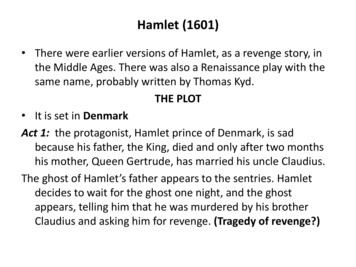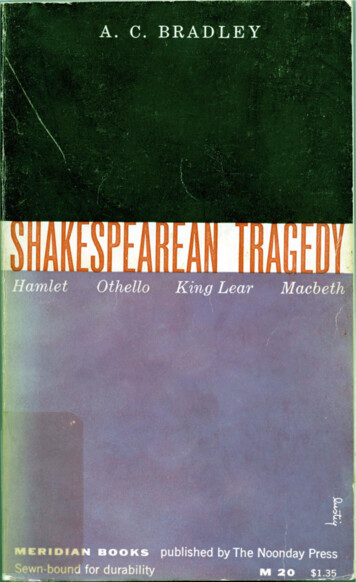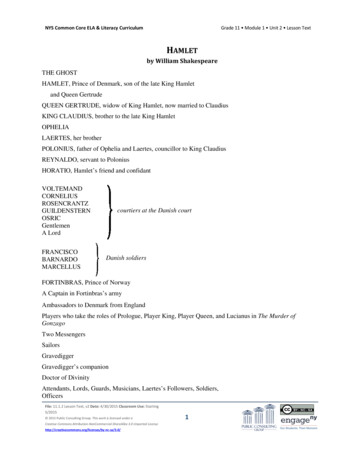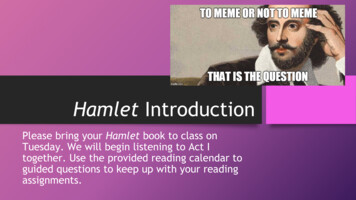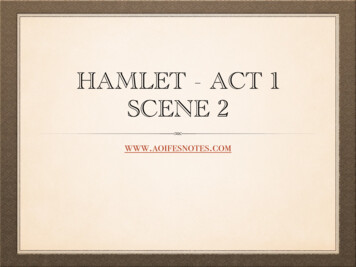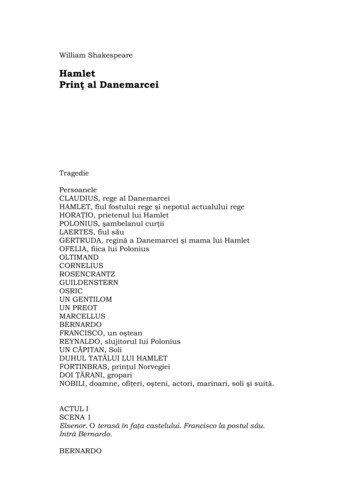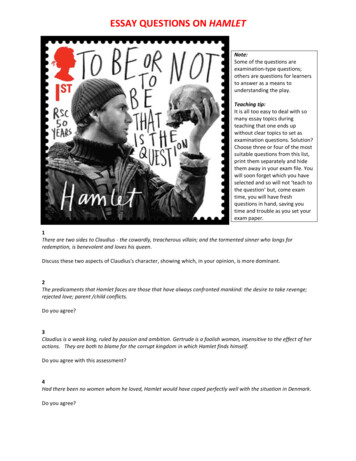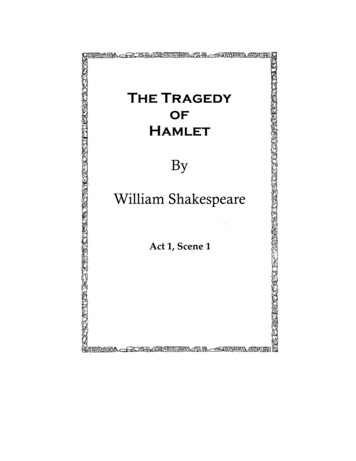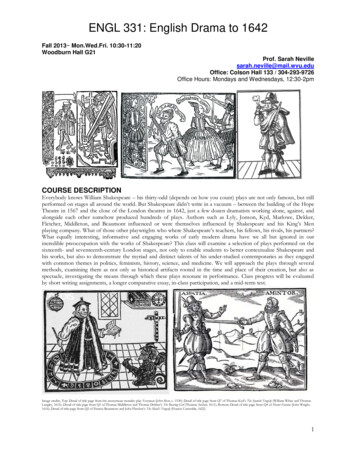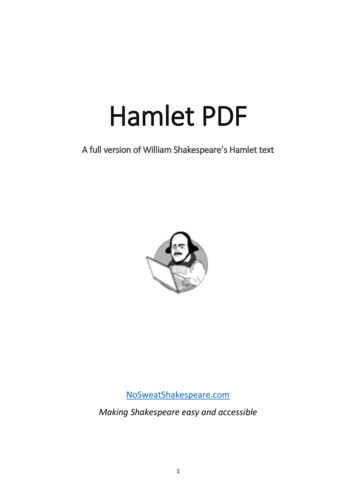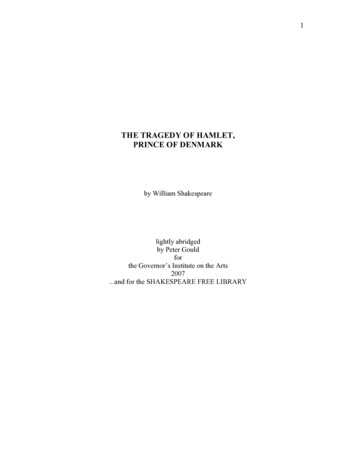
Transcription
1THE TRAGEDY OF HAMLET,PRINCE OF DENMARKby William Shakespearelightly abridgedby Peter Gouldforthe Governor’s Institute on the Arts2007.and for the SHAKESPEARE FREE LIBRARY
2THE TRAGEDY OF HAMLET, PRINCE OF DENMARKby William ShakespeareDRAMATIS PERSONAEClaudius, King of Denmark.Marcellus, Officer.Hamlet, son to the former, and nephew to the present king.Polonius, Lord Chamberlain.Horatio, friend to Hamlet.Laertes, son to Polonius.Rosencrantz, courtier.Guildenstern, courtier.Osric, courtier.A Gentleman, courtier.A Priest.Marcellus, officer.Bernardo, officer.Francisco, a soldierPlayers.Two Clowns, gravediggers.English Ambassadors.Gertrude, Queen of Denmark, mother to Hamlet.Ophelia, daughter to Polonius.Ghost of Hamlet's Father.Lords, ladies, Officers, Soldiers, Sailors, Messengers, Attendants.ACT I. Scene I.Elsinore. A platform before the Castle.Enter two Sentinels-Francisco, [who paces up and down at his post; then] Bernardo,Ber. Who’s there.?Fran. Nay, answer me. Stand and unfold yourself.Ber. Long live the King!Fran. Bernardo?Ber. He.Fran. You come most carefully upon your hour.Ber. 'Tis now struck twelve. Get thee to bed, Francisco.Fran. For this relief much thanks. 'Tis bitter cold,And I am sick at heart.Ber. Have you had quiet guard?Fran. Not a mouse stirring.Ber. Well, good night.If you do meet Horatio and Marcellus,The rivals of my watch, bid them make haste.
3Enter Horatio and Marcellus.Fran. I think I hear them. Stand, ho! Who is there?Hor. Friends to this ground.Mar. And liegemen to the Dane.Fran. Give you good night.Mar. O, farewell, honest soldier.Who hath reliev'd you?Fran. Bernardo hath my place.Give you good night.Exit.Mar. Holla, Bernardo!Ber. SayWhat, is Horatio there ?Hor. A piece of him.Ber. Welcome, Horatio. Welcome, good Marcellus.Mar. What, has this thing appear'd again to-night?Ber. I have seen nothing.Mar. Horatio says 'tis but our fantasy,And will not let belief take hold of himTouching this dreaded sight, twice seen of us.Therefore I have entreated him along,With us to watch the minutes of this night,That, if again this apparition come,He may approve our eyes and speak to it.Hor. Tush, tush, 'twill not appear.Ber. Sit down awhile,And let us once again assail your ears,That are so fortified against our story,What we two nights have seen.Hor. Well, sit we down,And let us hear Bernardo speak of this.Ber. Last night of all,When yond same star that's westward from the poleHad made his course t' illume that part of heavenWhere now it burns, Marcellus and myself,The bell then beating oneEnter Ghost.Mar. Peace! break thee off! Look where it comes again!Ber. In the same figure, like the King that's dead.Mar. Thou art a scholar; speak to it, Horatio.Ber. Looks it not like the King? Mark it, Horatio.Hor. Most like. It harrows me with fear and wonder.Ber. It would be spoke to.Mar. Question it, Horatio.Hor. What art thou that usurp'st this time of nightTogether with that fair and warlike formIn which the majesty of buried DenmarkDid sometimes march? By heaven I charge thee speak!
4Mar. It is offended.Ber. See, it stalks away!Hor. Stay! Speak, speak! I charge thee speak!Exit Ghost.Mar. 'Tis gone and will not answer.Ber. How now, Horatio? You tremble and look pale.Is not this something more than fantasy?What think you on't?Hor. Before my God, I might not this believeWithout the sensible and true avouchOf mine own eyes.Mar. Is it not like the King?Hor. As thou art to thyself.Such was the very armour he used to wear-'Tis strange.Mar. Thus twice before, and jump at this dead hour,With martial stalk hath he gone by our watch.Hor. In what particular thought to work I know not;But, in the gross and scope of my opinion,This bodes some strange eruption to our state.Ber. I think it be no other but e'en so.That this portentous figure so like the KingThat was, comes armed through our watch.Hor. A mote it is to trouble the mind's eye.They say that ere the mightiest Caesar fell,The graves stood tenantless, and the sheeted deadDid squeak and gibber in the Roman streets;As stars with trains of fire, and dews of blood,Disasters in the sun; and the moist starUpon whose influence Neptune's empire standsWas sick almost to doomsday with eclipse.And even the like precurse of fierce events---Enter Ghost again.But soft! behold! Lo, where it comes again!I'll cross it, though it blast me.- Stay illusion! Spreads his arms.If thou hast any sound, or use of voice,Speak to me.If there be any good thing to be done,That may to thee do ease, and, race to me,Speak to me.If thou art privy to thy country's fate,Which happily foreknowing may avoid,O, speak! Stop it, Marcellus!Mar. Shall I strike at it with my partisan?Hor. Do, if it will not stand.Ber. 'Tis here!Hor. 'Tis here!Mar. 'Tis gone! Exit Ghost.
5We do it wrong, being so majestical,To offer it the show of violence;For it is as the air, invulnerable,And our vain blows malicious mockery.Ber. It was about to speak, when the cock crew.Hor. And then it started, like a guilty thingUpon a fearful summons. I have heardThe cock, that is the trumpet to the morn,Doth with his lofty and shrill-sounding throatAwake the god of day; and at his warning,Whether in sea or fire, in earth or air,Th' extravagant and erring spirit hiesTo his confine; and of the truth hereinThis present object made probation.Mar. It faded on the crowing of the cock.Hor. Aye, look, the morn, in russet mantle clad,Walks o'er the dew of yon high eastward hill.Break we our watch up; and by my adviceLet us impart what we have seen to-nightUnto young Hamlet; for, upon my life,This spirit, dumb to us, will speak to him.Do you consent we shall acquaint him with it,As needful in our loves, fitting our duty?Let's do't, I pray; and I this morning knowWhere we shall find him most conveniently.Exeunt.Scene II.Elsinore. A room of state in the Castle.Flourish. [Enter Claudius, King of Denmark, Gertrude the Queen, Hamlet, Polonius,Laertes and his sister Ophelia, Lords Attendant.King. Though yet of Hamlet our dear brother's deathThe memory be green, and that it us befittedTo bear our hearts in grief, and our whole kingdomTo be contracted in one brow of woe,Yet so far hath discretion fought with natureThat we with wisest sorrow think on himTogether with remembrance of ourselves.Therefore our sometime sister, now our queen,Th' imperial jointress to this warlike state,Have we, as 'twere with a defeated joy,With an auspicious, and a dropping eye,With mirth in funeral, and with dirge in marriage,In equal scale weighing delight and dole,Taken to wife; nor have we herein barr'dYour better wisdoms, which have freely gone
6With this affair along. For all, our thanks.And now, Laertes, what's the news with you?You told us of some suit. What is't, Laertes?You cannot speak of reason to the DaneAnd lose your voice. What wouldst thou beg, Laertes,That shall not be my offer, not thy asking?The head is not more native to the heart,The hand more instrumental to the mouth,Than is the throne of Denmark to thy father.What wouldst thou have, Laertes?Laer. My dread lord,Your leave and favour to return to France;From whence though willingly I came to DenmarkTo show my duty in your coronation,Yet now I must confess, that duty done,My thoughts and wishes bend again toward FranceAnd bow them to your gracious leave and pardon.King. Have you your father's leave? What says Polonius?Pol. He hath, my lord, wrung from me my slow leaveBy laboursome petition, and at lastUpon his will I seal'd my hard consent.I do beseech you give him leave to go.King. Take thy fair hour, Laertes. Time be thine,And thy best graces spend it at thy will!But now, my cousin Hamlet, and my sonHam. [aside] A little more than kin, and less than kind!King. How is it that the clouds still hang on you?Ham. Not so, my lord. I am too much i' th' sun.Queen. Good Hamlet, cast thy nighted colour off,And let thine eye look like a friend on Denmark.Do not for ever with thy vailed lidsSeek for thy noble father in the dust.Thou know'st 'tis common. All that lives must die,Passing through nature to eternity.Ham. Ay, madam, it is common.Queen. If it be,Why seems it so particular with thee?Ham. Seems, madam, Nay, it is. I know not 'seems.''Tis not alone my inky cloak, good mother,Nor customary suits of solemn black,Nor windy suspiration of forc'd breath,No, nor the fruitful river in the eye,Nor the dejected havior of the visage,Together with all forms, moods, shapes of grief,'That can denote me truly. These indeed seem,For they are actions that a man might play;
7But I have that within which passeth showThese but the trappings and the suits of woe.King. 'Tis sweet and commendable in your nature, Hamlet,To give these mourning duties to your father;But you must know, your father lost a father;That father lost, lost his, and the survivor boundIn filial obligation for some termTo do obsequious sorrow. But to perseverIn obstinate condolement is a courseOf impious stubbornness. 'Tis unmanly grief;It shows a will most incorrect to heaven,A fault against the dead, a fault to nature,To reason most absurd, whose common themeIs death of fathers. We pray you throw to earthThis unprevailing woe, and think of usAs of a father; for let the world take noteYou are the most immediate to our throne,And with no less nobility of loveThan that which dearest father bears his sonDo I impart toward you. For your intentIn going back to school in Wittenberg,It is most retrograde to our desire;And we beseech you, bend you to remainHere in the cheer and comfort of our eye,Our chiefest courtier, cousin, and our son.Queen. Let not thy mother lose her prayers, Hamlet.I pray thee stay with us, go not to Wittenberg.Ham. I shall in all my best obey you, madam.King. Why, 'tis a loving and a fair reply.Be as ourself in Denmark. Madam, come.This gentle and unforc'd accord of HamletSits smiling to my heart; Come, come away.Flourish. Exeunt all but Hamlet.Ham. O that this too too solid flesh would melt,Thaw, and resolve itself into a dew!O God! God!How weary, stale, flat, and unprofitableSeem to me all the uses of this world!But two months dead! Nay, not so much, not two.So excellent a king, so loving to my motherThat he might not beteem the winds of heavenVisit her face too roughly. Heaven and earth!Must I remember? Frailty, thy name is woman!One month a widow, married with my uncle!My father's brother, but no more like my fatherThan I to Hercules. Within a month,
8Ere yet the salt of most unrighteous tearsHad left the flushing in her galled eyes,She married. O, most wicked speed, to postWith such dexterity to incestuous sheets!It is not, nor it cannot come to good.But break my heart, for I must hold my tongue!Enter Horatio, Marcellus, and Bernardo.Hor. Hail to your lordship!Ham. Horatio! I am glad to see you well.Hor. The same, my lord, and your poor servant ever.Ham. Marcellus?Mar. My good lord!Ham. I am very glad to see you.- [To Bernardo] Good even, sir.My friends, what brings you all to Elsinore?We'll teach you to drink deep ere you depart.Hor. My lord, I came to see your father's funeral.Ham. I prithee do not mock me, fellow student.I think it was to see my mother's wedding.Hor. Indeed, my lord, it followed hard upon.Ham. Thrift, thrift, Horatio! The funeral bak'd meatsDid coldly furnish forth the marriage tables.Would I had met my dearest foe in heavenOr ever I had seen that day, Horatio!My father- methinks I see my father.Hor. O, where, my lord?Ham. In my mind's eye, Horatio.Hor. I saw him once. He was a goodly king.Ham. He was a man, take him for all in all.I shall not look upon his like again.Hor. My lord, I think I saw him yesternight.Ham. Saw? who?Hor. My lord, the King your father.Ham. The King my father?Hor. Season your admiration for a whileWith an attent ear, till I may deliverUpon the witness of these gentlemen,This marvel to you.Ham. For God's love let me hear!Hor. Two nights together had these gentlemen(Marcellus and Bernardo) on their watchIn the dead vast and middle of the nightBeen thus encount'red. A figure like your father,Armed at point exactly,Appears before them and with solemn marchGoes slow and stately by them. Thrice he walk'dBy their oppress'd and fear-surprised eyes,
9Within his truncheon's length; whilst they distill'dAlmost to jelly with the act of fear,Stand dumb and speak not to him. This to meIn dreadful secrecy impart they did,And I with them the third night kept the watch;I saw your father’s ghost.Ham. But where was this?Mar. My lord, upon the platform where we watch'd.Ham. Did you not speak to it?Hor. My lord, I did;But answer made it none.Ham. 'Tis very strange.Hor. As I do live, my honour'd lord, 'tis true;And we did think it writ down in our dutyTo let you know of it.Ham. Indeed, indeed, sirs. But this troubles me.Hold you the watch to-night?Both [Mar. and Ber.] We do, my lord.Ham. I’ll watch to-night. Perchance 'twill walk again.Hor. I warr'nt it will.Ham. If it assume my noble father's person,I'll speak to it, though hell itself should gapeAnd bid me hold my peace. I pray you all,If you have hitherto conceal'd this sight,Let it be tenable in your silence still;And whatsoever else shall hap to-night,Give it an understanding but no tongue.I will requite your loves. So, fare you well.Upon the platform, 'twixt eleven and twelve,I'll visit you.All. Our duty to your honour.Ham. Your loves, as mine to you. Farewell. Exeunt [all but Hamlet].My father's spirit! In arms! All is not well.I doubt some foul play. Would the night were come!Exit.Scene III.Elsinore. A room in the house of Polonius.Enter Laertes and Ophelia.Laer. My necessaries are embark'd. Farewell.And, sister, let me hear from you.Oph. Do you doubt that?Laer. For Hamlet, and the trifling of his favour,Hold it a fashion, and a toy in blood;Perhaps he loves you now,But he himself is subject to his birth.
10He may not, as unvalued persons do,Carve for himself, for on his choice dependsThe safety and health of this whole state.Then weigh what loss your honour may sustainIf with too credent ear you list his songs,Or lose your heart, or your chaste treasure openTo his unmast'red importunity.Fear it, Ophelia, fear it, my dear sister,And keep you in the rear of your affection,Out of the shot and danger of desire.Oph. I shall th' effect of this good lesson keepAs watchman to my heart. But, good my brother,Do not as some ungracious pastors do,Show me the steep and thorny way to heaven,Whiles, like a puff'd and reckless libertine,Himself the primrose path of dalliance treadsnot heeding his own advice!Laer. O, fear me not!Enter Polonius.I stay too long. But here my father comes.Pol. Yet here, Laertes? Aboard, aboard, for shame!The wind sits in the shoulder of your sail,And you are stay'd for. There- my blessing with thee!And these few precepts in thy memoryLook thou character.Be thou familiar, but by no means vulgar:Those friends thou hast, and their adoption tried,Grapple them unto thy soul with hoops of steel;But do not dull thy palm with entertainmentOf each new-hatch'd, unfledg'd comrade. BewareOf entrance to a quarrel; but being in,Bear't that th' opposed may beware of thee.Give every man thine ear, but few thy voice;Take each man's censure, but reserve thy judgment.Costly thy habit as thy purse can buy,But not express'd in fancy; rich, not gaudy;For the apparel oft proclaims the man,And they in France of the best rank and stationAre most select and generous, chief in that.Neither a borrower nor a lender be;For loan oft loses both itself and friend,And borrowing dulls the edge of husbandry.This above all- to thine own self be true,And it must follow, as the night the day,Thou canst not then be false to any man.Farewell. My blessing season this in thee!
11Laer. Most humbly do I take my leave, my lord.Pol. The time invites you. Go, your servants tend.Laer. Farewell, Ophelia, and remember wellWhat I have said to you.Oph. 'Tis in my memory lock'd,And you yourself shall keep the key of it.Laer. Farewell.Exit.Pol. What is't, Ophelia, he hath said to you?Oph. So please you, something touching the Lord Hamlet.Pol. Marry, well bethought!'Tis told me he hath very oft of lateGiven private time to you, and you yourselfHave of your audience been most free and bounteous.If it be so- ahem- I must tell youYou do not understand yourself so clearlyAs it behooves my daughter and your honour.What is between you? Give me up the truth.Oph. He hath, my lord, of late made many tendersOf his affection to me.Pol. Affection? Pooh! You speak like a green girl!Oph. My lord, he hath importun'd me with loveIn honourable fashion.Pol. Ay, fashion you may call it. Go to, go to!Oph. And hath given countenance to his speech, my lord,With almost all the holy vows of heaven.Pol. Ay, springs to catch woodcocks! I do know,When the blood burns, how prodigal the soulLends the tongue vows.Ophelia, from this timeBe something scanter of your maiden presence.For Lord Hamlet, do not believe his vows;Believe so much in him, that he’s a man,And with a larger tether may he walkThan may be given you. In few, Ophelia,I would not, in plain terms, from this time forthHave you so slander any moment leisureAs to give words or talk with the Lord Hamlet.Look to't, I charge you. Come your ways.Oph. I shall obey, my lord.Exeunt.Scene IV.Elsinore. The platform before the Castle.Enter Hamlet, Horatio, and Marcellus.Ham. The air bites shrewdly; it is very cold.Hor. It is a nipping and an eager air.
12Ham. What hour now?Hor. I think it lacks of twelve.Mar. No, it is struck.Hor. Indeed? I heard it not. It then draws near the seasonWherein the spirit held his wont to walk.A flourish of trumpets, and two pieces go off.What does this mean, my lord?Ham. The King doth wake to-night and takes his rouse,Keeps wassail, and the swagg'ring upspring reels,And, as he drains his draughts of Rhenish down,The kettledrum and trumpet thus bray outThe triumph of his pledge.Hor. Is it a custom?Ham. Ay, marry, is't;But to my mind, though I am native hereAnd to the manner born, it is a customMore honour'd in the breach than the observance.This heavy-headed revel east and westMakes us traduc'd and tax'd of other nations;They call us drunkards and with swinish phraseSoil our addition; and indeed it takesFrom our achievements.So oft it chances in particular menThat, for some vicious mole of nature in them,As in their birth,- wherein they are not guilty,Since nature cannot choose his origin,By the o'ergrowth of some complexion,Oft breaking down the pales and forts of reason,Or by some habit that too much o'erleavensThe form of plausive manners, that these menCarrying, I say, the stamp of one defect,Being nature's livery, or fortune's star,Their virtues else- be they as pure as grace,As infinite as man may undergoShall in the general censure take corruptionFrom that particular fault. This dram of evil--Enter GhostHor. Look, my lord, it comes!Ham. Angels and ministers of grace defend us!Be thou a spirit of health or goblin damn'd,Bring with thee airs from heaven or blasts from hell,Be thy intents wicked or charitable,Thou com'st in such a questionable shapeThat I will speak to thee. I'll call thee Hamlet,King, father, royal Dane. O, answer me!What may this mean
13That thou, dead corpse, again in complete steel,Revisits thus the glimpses of the moon,So horridly to shake our dispositionWith thoughts beyond the reaches of our souls?Say, why is this? wherefore? What should we do?Ghost beckons Hamlet.Hor. It beckons you to go away with it,As if it some impartment did desireTo you alone.Mar. Look with what courteous actionIt waves you to a more removed ground.But do not go with it!Hor. No, by no means!Ham. It will not speak. Then will I follow it.Hor. Do not, my lord!Ham. Why, what should be the fear?Hor. What if it tempt you toward the flood, my lord,Or to the dreadful summit of the cliffThat beetles o'er his base into the sea,And there assume some other, horrible formWhich might deprive your sovereignty of reasonAnd draw you into madness? Think of it.Ham. It waves me still.Go on. I'll follow thee.Mar. You shall not go, my lord.Ham. Hold off your hands!Hor. Be rul'd. You shall not go. [ Ghost beckons.]Ham. Still am I call'd. Unhand me, gentlemen.By heaven, I'll make a ghost of him that lets me!I say, away!- Go on. I'll follow thee.Exeunt Ghost and Hamlet.Hor. He waxes desperate with imagination.Mar. Let's follow. 'Tis not fit thus to obey him.Hor. Have after. To what issue will this come?Mar. Something is rotten in the state of Denmark.Exeunt.Scene V.Elsinore. The Castle. Another part of the fortifications.Enter Ghost and Hamlet.Ham. Whither wilt thou lead me? Speak! I'll go no further.Ghost. Mark me.Ham. I will.Ghost. My hour is almost come,When I to sulph'rous and tormenting flamesMust render up myself.Ham. Alas, poor ghost!
14Ghost. Pity me not, but lend thy serious hearingTo what I shall unfold.Ham. Speak. I am bound to hear.Ghost. I am thy father's spirit,Doom'd for a certain term to walk the night,And for the day confin'd to fast in fires,Till the foul crimes done in my days of natureAre burnt and purg'd away. But that I am forbidTo tell the secrets of my prison house,I could a tale unfold whose lightest wordWould harrow up thy soul, freeze thy young blood,Make thy two eyes, like stars, start from their spheres,Thy knotted and combined locks to part,And each particular hair to stand an endLike quills upon the fretful porpentine.List, list, O, list!If thou didst ever thy dear father loveHam. O God!Ghost. Revenge his foul and most unnatural murder.Ham. Murder?Ghost. Murder most foul!Ham. Haste me to know't, that I, with wings as swiftAs meditation or the thoughts of love,May sweep to my revenge.Ghost. Now, Hamlet, hear.'Tis given out that, sleeping in my orchard,A serpent stung me. So the whole ear of DenmarkIs by a forged process of my deathRankly abus'd. But know, thou noble youth,The serpent that did sting thy father's lifeNow wears his crown.Ham. O my prophetic soul!My uncle?Ghost. Ay, that incestuous, that adulterate beast,With witchcraft of his wit, with traitorous giftsO wicked wit and gifts, that have the powerSo to seduce!- won to his shameful lustThe will of my most seeming-virtuous queen.O Hamlet, what a falling-off was there,From me, whose love was of that dignityThat it went hand in hand even with the vowI made to her in marriage.But soft! methinks I scent the morning air.Brief let me be. Sleeping within my orchard,My custom always of the afternoon,Upon my secure hour thy uncle stole,
15With juice of cursed hemlock in a vial,And in the porches of my ears did pourThe leperous distilment; whose effectHolds such an enmity with blood of manThat swift as quicksilver it courses throughThe natural gates and alleys of the body,And with a sudden vigour it doth curdThe thin and wholesome blood. So did it mine!Thus was I, sleeping, by a brother's handOf life, of crown, of queen, at once dispatch'd;Cut off even in the blossoms of my sin,No reckoning made, but sent to my accountWith all my imperfections on my head.Ham. O, horrible! O, horrible! most horrible!Ghost. If thou hast nature in thee, bear it not.Let not the royal bed of Denmark beA couch for luxury and damned incest.But, howsoever thou pursuest this deed,Act not against thy mother. Leave her to heaven,And to those thorns that in her bosom lodgeTo prick and sting her. Fare thee well at once.The glowworm shows the morning to be nearAnd gins to pale his uneffectual fire.Adieu! Remember me.Exit.Ham. Hold, hold, my heart!And you, my sinews, grow not instant old,But bear me stiffly up. Remember thee?Ay, thou poor ghost, while memory holds a seatIn this distracted globe. Remember thee?Yea, from the table of my memoryI'll wipe away all trivial fond records,That youth and observation copied there,And thy commandment all alone shall liveWithin the book and volume of my brain.O most pernicious woman!O villain, villain, smiling, damned villain!Hor. (within) My lord, my lord!Enter Horatio and Marcellus.Mar. What news, my lord?Ham. O, wonderful!Hor. Good my lord, tell it.Ham. No, you will reveal it.Hor. Not I, my lord, by heaven!Mar. Nor I, my lord.Ham. Touching this vision here,It is an honest ghost, that let me tell you.
16For your desire to know what is between us,O'ermaster't as you may. And now, good friends,As you are friends, scholars, and soldiers,Give me one poor request.Hor. What is't, my lord? We will.Ham. Never make known what you have seen to-night.Both. My lord, we will not.Ham. Nay, but swear't.Ghost cries under the stage.Ghost. Swear.Ham. Aha boy, say'st thou so? Art thou still there?Come on! You hear this fellow in the cellarage.Consent to swear.Hor. Propose the oath, my lord.Ham. Never to speak of this that you have seen.Swear by my sword.Ghost. [beneath] Swear.Ham. Come hither, gentlemen,And lay your hands again upon my sword.Never to speak of this that you have heard:Swear by my sword.Ghost. [beneath] Swear by his sword.Hor. O day and night, but this is wondrous strange!Ham. And therefore as a stranger give it welcome.There are more things in heaven and earth, Horatio,Than are dreamt of in your philosophy.But come! Swear.Ghost. [beneath] Swear. [They swear.]Ham. Rest, rest, perturbed spirit! So, gentlemen,With all my love I do commend me to you;Let us go in together;And still your fingers on your lips, I pray.However strange or odd I bear myself(As I perchance hereafter shall think meetTo put an antic disposition on),Never, at such times seeing me,Reveal my madness is but counterfeit.Agreed?Hor. & Mar. Agreed, my lord.Ham. Then come, let's go together.The time is out of joint. O cursed spiteThat ever I was born to set it right!Exeunt.
17Act II. Scene I.Elsinore. A room in the house of Polonius. Enter Ophelia.Oph. Father! Father! Enter Polonius.Pol. How now, Ophelia? What's the matter?Oph. O my lord, my lord, I have been so affrighted!Pol. With what, i' th' name of God?Oph. My lord, as I was sewing in my closet,Lord Hamlet, with his doublet all unbrac'd,No hat upon his head, his stockings foul'd,Pale as his shirt, his knees knocking each other,And with a look so piteous in purportAs if he had been loosed out of hellTo speak of horrors- he comes before me.Pol. Mad for thy love?Oph. My lord, I do not know,But truly I do fear it.Pol. What said he?Oph. He took me by the wrist and held me hard;Then goes he to the length of all his arm,And, with his other hand thus o'er his brow,He falls to such perusal of my faceAs he would draw it. Long stay'd he so.Then rais'd a sigh so piteous and profoundAs it did seem to shatter all his bulkAnd end his being. That done, he lets me go,And with his head over his shoulder turn'dHe seem'd to find his way without his eyes,For out o' doors he went without their helpAnd to the last bended their light on me.Pol. This is the very ecstasy of love,Whose violent property fordoes itselfAnd leads the will to desperate undertakingsAs oft as any passion under heavenThat does afflict our natures. I am sorry.What, have you given him any hard words of late?Oph. No, my good lord; but, as you did command,I did repel his letters and deniedHis access to me.Pol. That hath made him mad.I am sorry that with better heed and judgmentI had not noted him. I fear'd he did but trifleWith thee; by heaven. Come, go we to the King.This must be known; which, if it were kept hid,Might bring more grief upon us. Come, Ophelia.Exeunt.
18Scene IIa.Elsinore. A room in the Castle.Flourish. Enter King and Queen, Rosencrantz and Guildenstern, & others.King. Welcome, dearRosencrantz and Guildenstern.Moreover that we much did long to see you,The need we have to use you did provokeOur hasty sending. Something have you heardOf Hamlet's transformation. So I call it,Since not the outer nor the inward manResembles what it was. What it should be,More than his father's death, that thus hath put himSo much from th' understanding of himself,I cannot dream of. I entreat you bothThat, being of so young days brought up with him,You draw him on to pleasures, and to gatherSo much as from occasion you may glean,Whether aught to us unknown afflicts him thusThat, open'd, lies within our remedy.Queen. Good gentlemen, he hath much talk'd of you,And sure I am two men there are not livingTo whom he more adheres. If it will please youThus to expend your time with us awhileFor the supply and profit of our hope,Your visitation shall receive such thanksAs fits a king's remembrance.Ros. Both your MajestiesMight, by the sovereign power you have of us,Put your dread pleasures more into commandThan to entreaty.Guil. But we both obey,And here give up ourselves, in the full bent,To lay our service freely at your feet,To be commanded.King. Thanks, Rosencrantz and gentle Guildenstern.Queen. Thanks, Guildenstern and gentle Rosencrantz.And I beseech you instantly to visitMy too much changed son.- Go, some of you,And bring these gentlemen where Hamlet is.Guil. Heavens make our presence and our practicesPleasant and helpful to him!Queen. Ay, amen!Exeunt Rosencrantz and Guildenstern.Enter Polonius.
19King. Polonius, good minister, what news?Pol. Assure you, my good liege,I hold my duty as I hold my soul,Both to my God and to my gracious king;King. Your drift, Polonius?Pol. That I do think- or else this brain of mineHunts not the trail of policy so sureAs it hath us'd to do- that I have foundThe very cause of Hamlet's lunacy.King. O, speak of that! That do I long to hear.He tells me, my dear Gertrude, he hath foundThe head and source of all your son's distemper.Queen. I doubt it is no other but the main,His father's death and our o'erhasty marriage.King. Well, we shall sift him. Proceed, dear counselor.Pol. My liege, and madam, to expostulateWhat majesty should be, what duty is,Why day is day, night is night, and time is time.Were nothing but to waste night, day, and time.Therefore, since brevity is the soul of wit,I will be brief. Your noble son
3 Enter Horatio and Marcellus. Fran.I think I hear them. Stand, ho! Who is there? Hor.Friends to this ground. Mar.And liegemen to the Dane. Fran.


